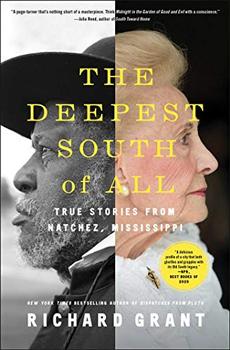Summary | Excerpt | Reviews | Beyond the Book | Read-Alikes | Genres & Themes | Author Bio

Critics' Opinion:
Readers' Opinion:
First Published:
Sep 2020, 288 pages
Paperback:
Aug 2021, 288 pages
 Book Reviewed by:
Book Reviewed by:
Jane McCormack
Buy This Book
This article relates to The Deepest South of All
 Richard Grant's The Deepest South of All examines the aftermath of slavery in the Deep South through the lens of Natchez, Mississippi. One clear inference that can be made from his Natchezian narratives is that the past must be confronted before it can lay dormant in its grave. Unfortunately, history is often written with its authors only addressing that which they personally deem important. Grant raises this issue in his exploration of Natchez when he broaches the glaring oversight of the Parchman Ordeal.
Richard Grant's The Deepest South of All examines the aftermath of slavery in the Deep South through the lens of Natchez, Mississippi. One clear inference that can be made from his Natchezian narratives is that the past must be confronted before it can lay dormant in its grave. Unfortunately, history is often written with its authors only addressing that which they personally deem important. Grant raises this issue in his exploration of Natchez when he broaches the glaring oversight of the Parchman Ordeal.
The Parchman Ordeal occurred in Natchez in October, 1965, when nearly 150 primarily Black protestors were arrested and taken to the notorious Mississippi State Penitentiary at Parchman, where they were stripped, searched, taunted and humiliated. They had set out to assert their civil rights and bring attention to racial inequality through peaceful protest. At the penitentiary, they were subjected to dehumanizing conditions and abuse. The ordinance that was allegedly grounds for their arrests was later ruled unconstitutional, but many of those who were detained are still haunted by the experience.
The Parchman Ordeal, like much of the history of racism Grant mentions, has been buried for the most part. However, the origins of the Parchman Penitentiary provide additional context for the event and call attention to other history that has been conveniently disregarded. The penitentiary is located on the former Parchman plantation, which the state of Mississippi bought in the early 20th century and turned into a penal farm where predominantly Black prisoners worked grueling hours in the fields under the scorching sun, were whipped and frequently died from these conditions. Parchman Farm, like many other penal farms in the United States, used prison labor for profit, essentially maintaining a legal form of slavery. Although "deplorable conditions and practices" at Parchman were ended in 1971 as the result of a class-action lawsuit, the penitentiary still operates as a penal farm, and inhumane, violent conditions have continued to be reported in recent years. The abominable history of the Parchman land is chronicled in historian David Oshinsky's Worse Than Slavery: Parchman Farm and the Ordeal of Jim Crow Justice.
As Grant explores the divide between white and Black Natchezians today, he notes that many of the city's white members "could perform extraordinary feats of amnesia." This dismissal of racist history that occurs not only in Natchez but throughout the country often thwarts progress.
In 2015, the Black community of Natchez declined the opportunity to participate in the city's tricentennial celebration. As Darrell White, the Director of the African American museum in Natchez, noted, "[T]here's too much pain in those 300 years, too many open wounds." White cited the much-overlooked Parchman Ordeal as a strong example.
This reminder of the incident spurred some Natchezians into action. A young white lawyer, Hyde Carby, wrote an official apology letter on behalf of the city which Mayor Butch Brown (a white man) read out loud, bringing some survivors of the event to tears, as they had not believed an apology would ever be issued. In addition, advocates such as Darryl Grennell (a Black man who followed Butch Brown as mayor) put into motion the creation of a monument entitled "Proud to Take a Stand" to commemorate those individuals who took a stand on the streets of Natchez in 1965. The monument was unveiled in October of 2019, over 50 years after the event, and is one of the first monuments to Black history in the city of Natchez.
Filed under People, Eras & Events
![]() This "beyond the book article" relates to The Deepest South of All. It originally ran in October 2020 and has been updated for the
August 2021 paperback edition.
Go to magazine.
This "beyond the book article" relates to The Deepest South of All. It originally ran in October 2020 and has been updated for the
August 2021 paperback edition.
Go to magazine.





The Funeral Cryer by Wenyan Lu
Debut novelist Wenyan Lu brings us this witty yet profound story about one woman's midlife reawakening in contemporary rural China.
Your guide toexceptional books
BookBrowse seeks out and recommends the best in contemporary fiction and nonfiction—books that not only engage and entertain but also deepen our understanding of ourselves and the world around us.